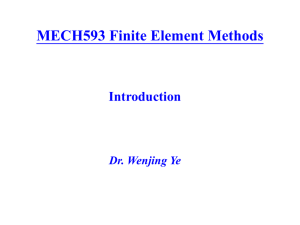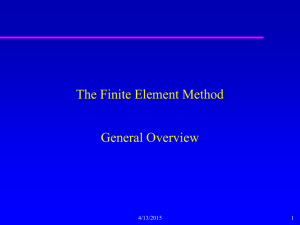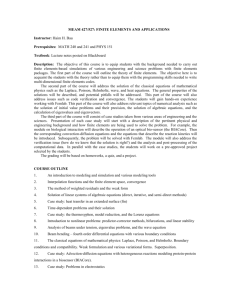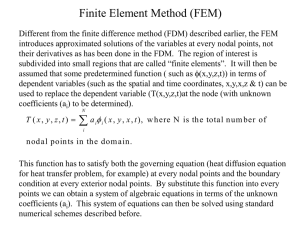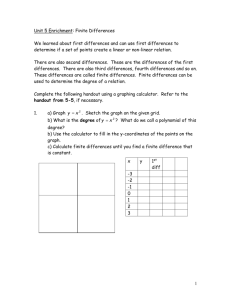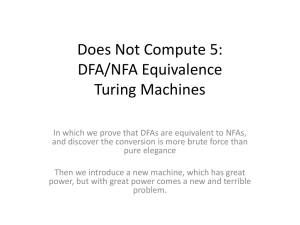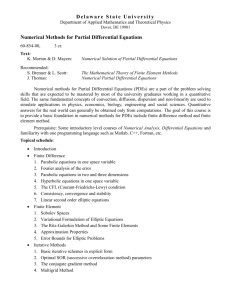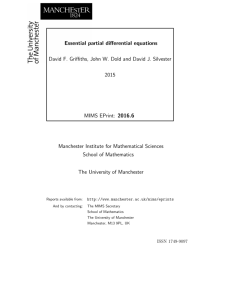Graduate Courses for MAE Research Students (MA7/M9 Series
advertisement
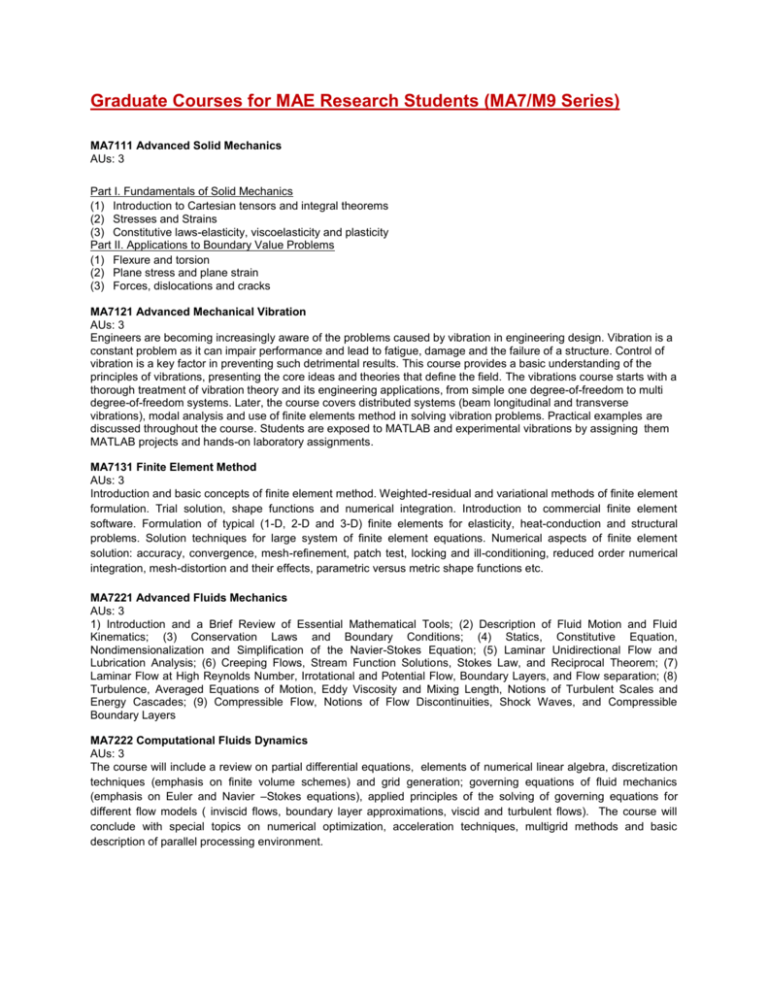
Graduate Courses for MAE Research Students (MA7/M9 Series) MA7111 Advanced Solid Mechanics AUs: 3 Part I. Fundamentals of Solid Mechanics (1) Introduction to Cartesian tensors and integral theorems (2) Stresses and Strains (3) Constitutive laws-elasticity, viscoelasticity and plasticity Part II. Applications to Boundary Value Problems (1) Flexure and torsion (2) Plane stress and plane strain (3) Forces, dislocations and cracks MA7121 Advanced Mechanical Vibration AUs: 3 Engineers are becoming increasingly aware of the problems caused by vibration in engineering design. Vibration is a constant problem as it can impair performance and lead to fatigue, damage and the failure of a structure. Control of vibration is a key factor in preventing such detrimental results. This course provides a basic understanding of the principles of vibrations, presenting the core ideas and theories that define the field. The vibrations course starts with a thorough treatment of vibration theory and its engineering applications, from simple one degree-of-freedom to multi degree-of-freedom systems. Later, the course covers distributed systems (beam longitudinal and transverse vibrations), modal analysis and use of finite elements method in solving vibration problems. Practical examples are discussed throughout the course. Students are exposed to MATLAB and experimental vibrations by assigning them MATLAB projects and hands-on laboratory assignments. MA7131 Finite Element Method AUs: 3 Introduction and basic concepts of finite element method. Weighted-residual and variational methods of finite element formulation. Trial solution, shape functions and numerical integration. Introduction to commercial finite element software. Formulation of typical (1-D, 2-D and 3-D) finite elements for elasticity, heat-conduction and structural problems. Solution techniques for large system of finite element equations. Numerical aspects of finite element solution: accuracy, convergence, mesh-refinement, patch test, locking and ill-conditioning, reduced order numerical integration, mesh-distortion and their effects, parametric versus metric shape functions etc. MA7221 Advanced Fluids Mechanics AUs: 3 1) Introduction and a Brief Review of Essential Mathematical Tools; (2) Description of Fluid Motion and Fluid Kinematics; (3) Conservation Laws and Boundary Conditions; (4) Statics, Constitutive Equation, Nondimensionalization and Simplification of the Navier-Stokes Equation; (5) Laminar Unidirectional Flow and Lubrication Analysis; (6) Creeping Flows, Stream Function Solutions, Stokes Law, and Reciprocal Theorem; (7) Laminar Flow at High Reynolds Number, Irrotational and Potential Flow, Boundary Layers, and Flow separation; (8) Turbulence, Averaged Equations of Motion, Eddy Viscosity and Mixing Length, Notions of Turbulent Scales and Energy Cascades; (9) Compressible Flow, Notions of Flow Discontinuities, Shock Waves, and Compressible Boundary Layers MA7222 Computational Fluids Dynamics AUs: 3 The course will include a review on partial differential equations, elements of numerical linear algebra, discretization techniques (emphasis on finite volume schemes) and grid generation; governing equations of fluid mechanics (emphasis on Euler and Navier –Stokes equations), applied principles of the solving of governing equations for different flow models ( inviscid flows, boundary layer approximations, viscid and turbulent flows). The course will conclude with special topics on numerical optimization, acceleration techniques, multigrid methods and basic description of parallel processing environment. MA7321 Advanced Kinematic Theory of Mechanism AUs: 3 Displacements: Rigid transformations, planar, spherical and spatial displacements; Motion: Motion of a rigid body, the derivative of a motion and multi-parameter motion; Screw theory: Screw coordinate transformations, bivectors, screw systems and dual orthogonal matrices; Quaternions: Clifford Algebras, Planar quaternions, quaternions and dual quaternions; Lie algebra: Lie groups, subgroups, and Lie algebra; Mobility: Mobility in the plane, on sphere and in space; Structure Equations: The general form, planar, spherical and spatial mechanisms; Constraint manifolds: Planar, spherical and spatial mechanisms. MA7511 Design and Analysis of Experiments AUs: 3 1. Introduction to Probability and Statistics (6 hours) Data organization and sampling determination. Descriptive statistics. Probability distributions of random variables (normal, t, Chi-square, F). Sampling distributions of means and variances. Confidence intervals. Hypothesis tests for mean and variance. Type I and type II errors. 2. Simple Comparative Experiments (3 hours) Introduction to strategy of experimentation. Guidelines for designing experiments. Using statistical techniques in experimentation. Sampling and sampling distributions. Inferences about differences in means for randomized designs and paired comparison designs. Inferences about variances of normal distributions. 3. Experiments With A Single Factor (6 hours) Introduction to Analysis of Variance (ANOVA). Analysis of fixed effects model. Model adequacy checking. Practical interpretation of results. Determination of sample size. Regression approach to ANOVA. Nonparametric methods in ANOVA. Randomized complete block design. 4. Factorial Designs (9 hours) Basic definitions and principles. Advantage of factorials. Two-factor factorial design. General factorial design. Fitting response curves and surfaces. Blocking in factorial design. 2 2 and 23 designs. General 2k designs. Single replicate of 2k design. Addition of center points to 2k design. Blocking and confounding in 2k design. 5. Fractional Designs (6 hours) Two-level fractional designs. One-half fraction of 2k design. One-quarter fraction of 2k design. General 2k-p fractional design. Resolution III, IV and V designs. Supersaturated designs. 6. Advanced Techniques In Doe (9 hours) Three-level and mixed-level factorial and fractional designs. Response surface methods and designs. Robust parameter design and process robustness studies. Experiments with random factors. Nested and split-plot designs. Nonnormal responses and transformation. Unbalanced data in factorial design. MA7805 Advanced Engineering Mathematics AU: 3 The subject introduces the fundamental concepts in the partial differential equations. Some modern development in the area, such as non-linear systems and chaos, perturbation technique, finite element and boundary element method, biotic processes (self-organization and complexity) are introduced. The subject is designed to let postgraduate students have common sense and benchmark for their numerical and experimental research works and stay updated on the most recent developments in applied PDEs. Part I. PARTIAL DIFFERENTIAL EQUATIONS: a short review of PDEs; exact methods of solutions to PDEs; special functions arising during solving some PDEs (Bessel functions, Legendre polynomials, etc.); Green's function and its application in solving PDEs: diffusion and waves in finite domains; method of images; variational calculus: optimal solutions of integral equations. [13 hours] Part II. INTRODUCTION TO NON-LINEAR PROBLEMS: non-linear phenomena; introduction to non-linear ODEs and PDEs: epidemics, competition, predator-pray, chemotaxis, and flow through porous media models; concept of stability and chaos in non-linear systems; regular perturbation and singular perturbation; non-linear analysis of fractal time series: chaotic phenomena versus biotic phenomena (self-organization and complexity). [8 hours] Part III. BASIC CONCEPTS OF NUMERICAL SCHEME: Analysis of the properties of numerical methods; finite difference and finite volume methods; computational grids; variational principle; Galerkin method and finite element method (FEM); Boundary Integral equation approach and boundary element method (BEM). Applications to boundary value and initial value problems. [18 hours] MA7231 Advanced Heat and Mass Transfer AU: 3 The course includes conservation laws, multi-dimensional steady and transient conduction, forced and natural laminar and turbulent convection, phase change and mass transfer. Classical analytical solutions will be presented to elucidate the physical meaning of the results. In addition, the latest development in microscale heat and mass transfer will also be introduced. The course is open to students from mechanical, aerospace, chemical and materials engineering. The problems and examples will include theory and applications drawn from a wide range of engineering problems related to heat and mass transfer processes.
